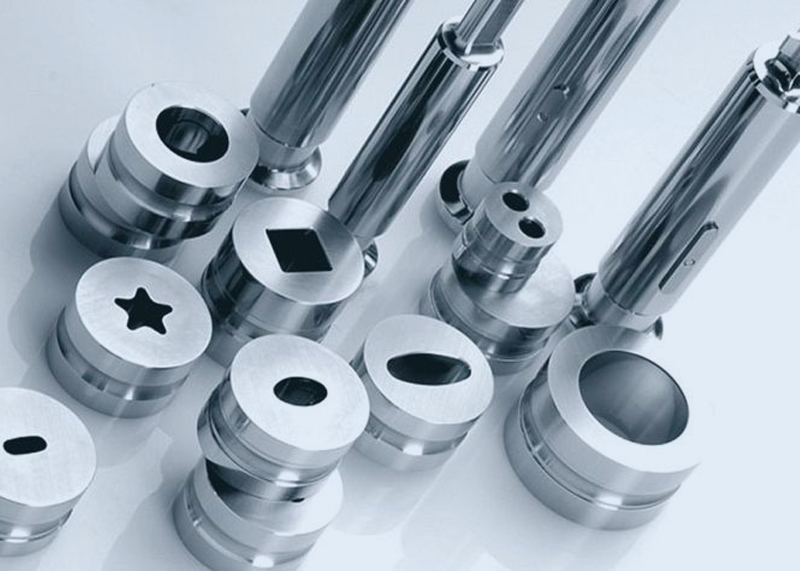What is Punches and Dies?
Punches and dies are basic components used in various manufacturing processes in industries such as pharmaceuticals, automotive, aerospace and more. These tools are particularly important in processes that involve shaping or forming materials into specific shapes or configurations. The term "punch and die" refers to a set of two tools: a punch and a die, which work together to perform operations such as cutting, punching, bending, or shaping materials. A punch is a tool typically made of hardened steel or other durable material, with a shaped or pointed end that applies force to the material being worked. It is usually connected to a mechanical or hydraulic press, which provides the necessary force to drive the punch through the material. The size and shape of the punch depends on the desired results of the manufacturing process. For example, punches can have flat, round or custom-shaped ends to create specific cuts or indentations in the material.

On the other hand, the die is the counterpart of the punch and acts as a mold or counterpart of the punch. Dies are usually made of hardened steel and have a hole that matches the size of the punch. When the punch is forced through the material, it interacts with the die, which helps shape or form the material into the desired configuration. Dies may include additional features such as cutting edges or surface bending to facilitate certain manufacturing operations. Together, the punch and die enable a wide range of manufacturing processes including shearing, blanking, piercing, forming and extruding. In the pharmaceutical industry, for example, punches and dies are used in tablet manufacturing to shape powders or granules into tablets of precise size and weight. In sheet metal fabrication, punches and dies are used to cut, bend, or stamp sheet metal into various components used in automotive, aerospace, and construction applications.
An important advantage of using punches and dies in the manufacturing process is their high accuracy and repeatability. Precisely machined surfaces of punches and dies ensure consistency in finished products, minimizing variation in dimensions, tolerances and surface finish. This level of precision is necessary to produce high-quality components that meet strict quality standards and specifications. punches and dies are designed for durability and longevity, capable of withstanding the high forces and stresses encountered during production operations. Manufacturers often use advanced materials and heat treatment techniques to increase hardness, wear resistance, and toughness of punches and dies, extending equipment life and minimizing downtime for maintenance or replacement.
Punches and dies are versatile tools used to shape, cut, bend, or form materials into specific configurations in a variety of manufacturing processes. Be it pharmaceuticals, automotive or sheet metal fabrication, these tools play a vital role in achieving accuracy, consistency and efficiency in manufacturing operations. Due to their robust construction and ability to produce high-quality results, punches and dies are indispensable components in modern manufacturing industries.
Features and Benefits of Punches and Dies
Features and benefits of punches and dies include several properties that contribute to their essential role in manufacturing processes in industries. bellow are the some features and benefits of the punches and dies.
Precision Machining:
Punches and dies are machined to precise specifications, ensuring accurate shaping, cutting or forming of material. This precision allows the production of components with consistent dimensions and tolerances, critical to obtaining high-quality finished products.
Versatility:
Punches and dies can be designed and customized to perform a variety of tasks including cutting, punching, bending, forming and extruding. Manufacturers can tailor the shapes, sizes and configurations of punches to the specific requirements of various manufacturing processes and applications.
Durability and longevity:
High-quality punches and dies are manufactured from durable materials such as hardened steel, carbide or tool steel. These materials are selected for their resistance to wear, abrasion and deformation, ensuring long equipment life and reducing the need for frequent replacement.
Enhanced Efficiency:
Accurate design and construction of punches and dies contributes to efficient execution of production operations. By consistently producing components with precise dimensions and tolerances, punches and dies optimize production processes, reduce material waste and increase overall productivity.
Cost-Effectiveness:
Although punches and dies require an initial investment, their durability and longevity provide significant cost savings over time. By reducing downtime for maintenance or replacement and increasing production efficiency, punch and die manufacturers help reduce operational costs and improve profitability.
Customization Options:
Manufacturers offer customization options for punches and dies to meet the specific needs and requirements of various applications. Customized features may include special coatings for enhanced wear resistance, unique shapes or profiles for specific functions, or integrated cooling channels for improved thermal management.
Safety:
Punches and dies are designed with safety in mind, incorporating features such as guards, shields or safety interlocks to protect the operator from potential hazards during operation. By ensuring safe and reliable operation, punch and die products contribute to a safe work environment for employees.
Quality Assurance:
The accuracy and consistency achieved with punches and dies contributes to the overall quality of the components produced. By minimizing variations in dimensions, tolerances and surface finishes, punches and dies help manufacturers produce high-quality products that meet or exceed customer expectations and regulatory requirements.
The advantages of punches and dies make them indispensable tools in modern manufacturing processes. From precision machining to durability, performance and safety, punches and dies play a critical role in achieving high-quality, cost-effective production across a wide range of industries and applications.
